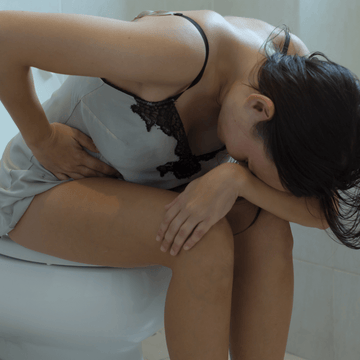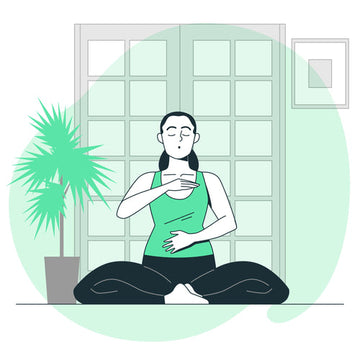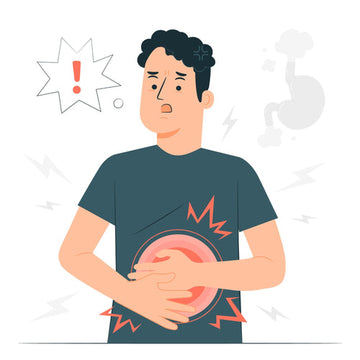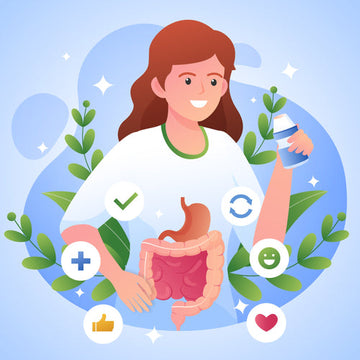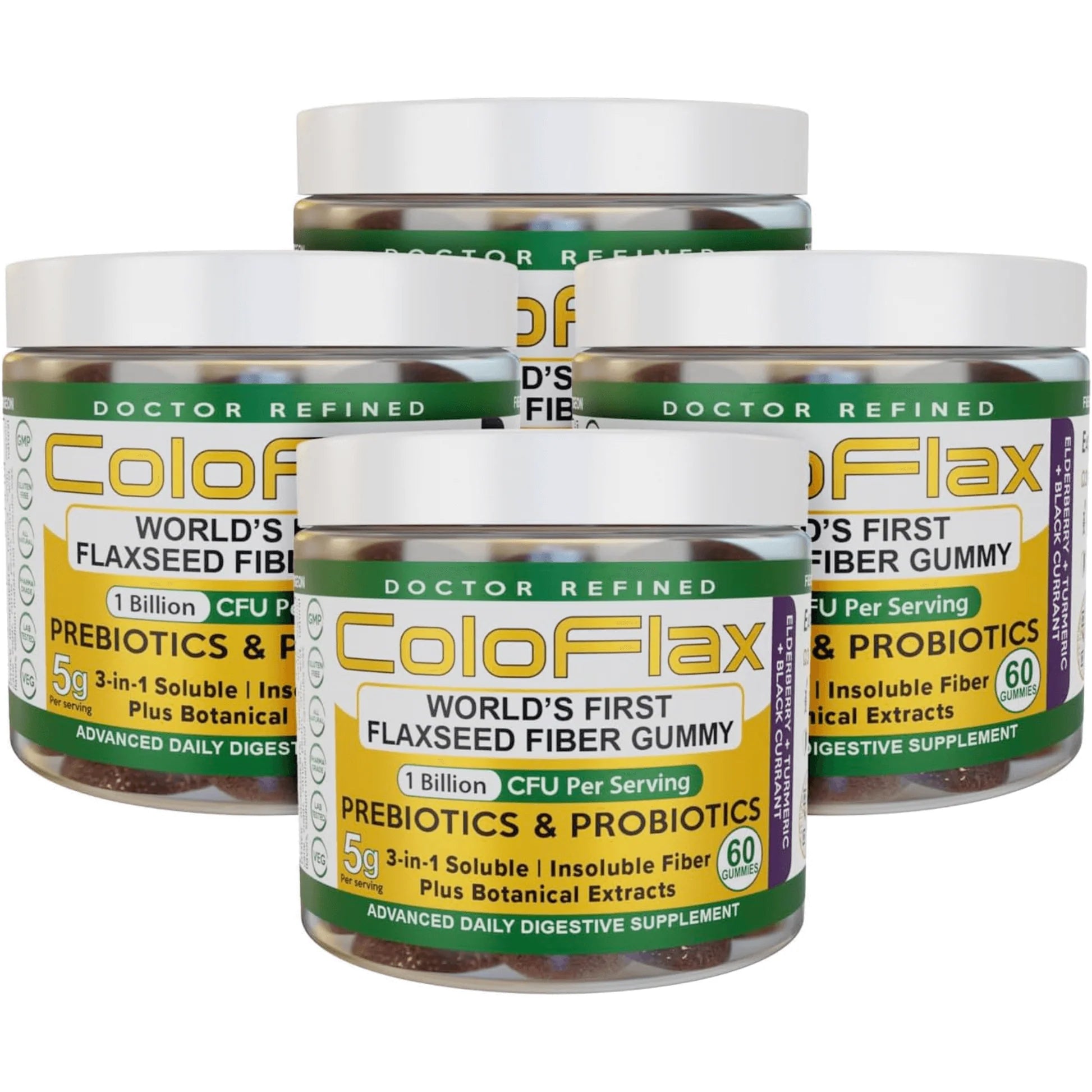Constipated, nauseous? It’s an unpleasant but fairly common combination of symptoms. Oftentimes, the cause is innocuous, but there are some exceptions, and even if there is no serious underlying cause, it still makes for a very unpleasant experience.
In the following guide, we’ll look at some of the most common causes of constipation and nausea, helping you to pinpoint the issue and find a quick and effective solution.
Can Constipation Cause Nausea?
If you’re suffering from constipation and nausea, there’s a chance that the former is causing the latter. Digestive discomfort can turn to queasiness, and it could leave you with a sickly feeling that you can’t seem to shake.
The more constipated you are, the more likely it is to cause nausea and the stronger that nausea will be.
The general malaise that you feel when you’re constipated isn’t the only cause.
When your digestive tract hits a gridlock, gas, bacteria, and fecal matter build up. Having all of that swirling around your gut is bound to lead to unpleasant side effects.
If you’re prone to acid reflux, you may suffer frequent bouts. Flatulence could also be an issue.
For some tips on dealing with constipation, check out our guide to the causes and solutions of constipation.
How to Cure Nausea Caused by Constipation
If you have determined that your nausea is being caused by chronic constipation, there are a few steps you can take:
- Drink Water: You’d be amazed at how effective a few glasses of water can be for curing constipation. Dehydration is one of the leading causes, and if you’re constantly depriving yourself of water and suddenly drink a couple of glasses, you’ll likely find that everything starts moving again down there.
- Exercise: After drinking water, move around a little. Go for a walk and do some stretches. Your body is not a ketchup bottle and you don’t need to shake it to get everything out, but any time you apply pressure to the area or get a helping hand from gravity, it stimulates movement.
- Eat Fiber: A high-fiber diet is essential for beating chronic constipation. Look for soluble fiber and fiber supplements like ColoFlax. Soluble fiber creates a gelatinous bulk in your gut that helps to push everything through. Just make sure you drink lots of water throughout the day when taking fiber supplements or increasing your fiber intake.
- Try Prunes: The idea that you can drink prune juice to instantly cure constipation is not an old wife’s tale. It’s true, and it‘s incredibly effective. Prunes contain a type of sugar that draws water into the gut, helping to flush everything out. It’s super sweet and somewhat of an acquired taste, but it works, so pinch your nose and drink that juice!
- Take a Laxative: As a last resort, consider taking a laxative. There are several options out there. Stimulant laxatives containing senna are often the best first course of action and should work within 8 hours. We wouldn’t recommend taking a laxative at the same time as drinking prune juice though, as it could make for a messy outcome. Give one method time to work before trying the other.
How to Cure General Nausea
If the nausea doesn’t leave following a bowel movement, or you need a more immediate solution, there are a few things you can try:
- Try Ginger: Ginger is very effective at curing nausea. Try some stem ginger or make a cup of ginger tea. It will instantly settle your stomach and combat those sickly sensations.
- Breathe Deep: Sometimes, a little breathing exercise is all you need. Sit straight, don’t hunch, and breathe deeply while focusing on your breath.
- Drink Water: Not only is water great for curing constipation, but hydration could combat your nausea as well.
- Relax: Try not to stress too much and avoid pacing, exercising, or doing anything that will overexert you. It’s best just to sit down and wait for the moment to pass.
- Avoid Triggers: If certain thoughts, smells, or foods make nausea worse, then abstain.
If nausea occurs after eating, it could be a sign of a digestive issue. It could also be caused by constipation, as you’re basically adding more food to a gridlocked digestive tract and creating more pressure and problems.
Try eating smaller meals, drinking more fluids, and eating slowly. Take smaller bites and chew more to get the digestive juices flowing.
What Else Causes Constipation and Nausea?
If you’re sure that your constipation isn’t the cause of your nausea, there are a few other potential causes:
Food Intolerances
Food intolerances can cause all kinds of digestive issues, including constipation, diarrhea, nausea, and vomiting. They can be hard to pin down, but if you pay attention to your diet and when your symptoms appear, you can get there through trial and error.
Gluten intolerance can cause such issues, but there are many more individuals following a gluten-free diet than there are people who actually have celiac disease. So, don’t assume that gluten is causing the problem and consider other foods, including lactose and fructose.
Too Much Processed Food
A diet rich in processed food can wreak havoc on your digestive system. Processed food is high in saturated fat, sodium, and sugar. It’s also very low in dietary fiber. Not only does this result in a much greater risk of chronic disease, but it can also cause flatulence, bloating, constipation, and nausea.
Try reducing the amount of processed food that you eat, including fast food and TV dinners. Eat more fruits and vegetables. They don’t have to be fresh; frozen works just as well. If you’re not a big fan of fresh vegetables, rely on beans, legumes, nuts, and seeds to get your fix of healthy fats and fiber.
As we have recommended many times before, you don’t have to go all or nothing. If you’re currently eating a diet rich in processed food, simply make a few changes. Swap your dinnertime Big Mac for a healthy salad or pasta dish. Swap snacks of chips and French fries for fruit and nuts.
Oftentimes, making a drastic, all-or-nothing switch just results in a relapse a few days or weeks down the line. Simple changes are best. As long as you’re making improvements, you’re heading in the right direction, and that’s all that matters.
Digestive Disorders
Digestive disorders like Inflammatory Bowel Disease (IBD) and Inflammatory Bowel Syndrome (IBS) often cause nausea and digestive issues. Flatulence, bloating, and diarrhea are some of the most common symptoms, but you may also experience occasional bouts of constipation.
If you suspect that you have IBS, IBD, or another digestive disorder, speak with your doctor.
Medication
There are a few different medications that can cause both constipation and nausea. The leaflet will tell you more, and you can also get advice from your doctor. However, strong pain medications, antidepressants, and allergy medications are some of the most common culprits.
Take opioids/opiates as an example. This is a class of medication that covers everything from tramadol and codeine to hydrocodone and morphine.
Opiates and opioids are analgesics. They are prescribed for moderate to severe pain. Constipation is one of the most common side effects, with many users complaining that their bowel movements essentially stop dead when they take these medications.
To combat this, you need to increase your fiber intake, drink more water, and exercise more—all of the things you do to improve your digestive health.
Many users also report feeling nauseous. It’s a common side effect with many drugs that affect mood, energy levels, and perception, and as we’re talking about narcotic medications, those effects are pronounced.
Constipation is something that doesn’t usually go away with opioid/opiate use, although it becomes less of a problem with smaller doses. Nausea is different. It usually only presents in the early stages of use or when you increase your dose. However, you may suffer from nausea if you take your medication on an empty stomach, when you’re very tired/stressed, or in combination with other substances.
For instance, drinking alcohol while taking strong painkillers could increase the risk of side effects. Medications designed to treat anxiety, depression, insomnia, and muscle spasms are also best avoided while under the influence of strong painkillers.
If you suspect that your medications are causing the issue, consult with your doctor. They can help you to find a suitable solution, whether that means reducing the dose, switching to another medication, or prescribing drugs to help with nausea and/or constipation.
Stress
In previous blogs, we’ve talked about the strange effects that your digestive health has on your mental health. If you’re constipated, for instance, you might feel lethargic, depressed, anxious, and even emotional.
The same is true for the reverse. If you are stressed, it can have a direct and indirect impact on your digestive health and general well-being.
The chemicals released during periods of high stress are partly responsible for these symptoms. They can have an adverse effect on many aspects of your health. And when you’re not feeling yourself, you’re less likely to eat healthier and drink adequate amounts of water.
So, if you are going through a stressful time, pay more attention to your diet and compensate by trying to relax more.
Sleep is also important. It’s one of the first things that suffers during times of high stress, and it can also mess with your hormones and cause a range of health issues. Calculate how much sleep you’re getting, and if you fall short of the 6 to 8 recommended hours, it’s time to make a change.
Pregnancy
Many women experience morning sickness early in their pregnancy. This could be accompanied by constipation, often as a result of their eating habits or general digestive distress.
“Morning sickness” is somewhat of a misnomer, as it can occur at any time of the day. A pregnancy test can tell you what you need to know and your doctor can confirm it and provide advice.
Summary: Causes of Constipation and Nausea
If you find that you’re suffering from regular bouts of constipation and nausea, and you can’t find an obvious and curable cause, you should consult your doctor.
As noted above, most causes of constipation and nausea are innocuous, but there are exceptions. It’s always good to rule the bad stuff out. And even if it turns out to be nothing, your doctor can still provide some useful advice and may even prescribe helpful medication.
If nothing else, it’ll put your mind at ease, and that alone is often worth the time, effort, and cost of a doctor’s visit.

